Detailed Legal Report: Estate Distribution, Wills, and Inheritance Tax
VerifiedAdded on 2023/06/14
|16
|5716
|441
Report
AI Summary
This report provides a comprehensive analysis of estate distribution, wills, and inheritance tax planning, focusing on the case of Arthur and Amanda. It examines the distribution of estates under intestacy rules, identifies issues related to their will instructions, and advises on the procedure for Arthur to execute his will given his disability. The report also addresses specific queries regarding inheritance tax, including the implications of transferring property titles, reconsidering death in service payment nominations, investing in shares, and making lifetime gifts of cash. The report concludes by offering recommendations to minimize inheritance tax and ensure clear and legally sound estate planning, highlighting the importance of detailed and unambiguous will instructions. Desklib is a platform where students can find similar solved assignments and past papers.

End of Module project
Paraphrase This Document
Need a fresh take? Get an instant paraphrase of this document with our AI Paraphraser
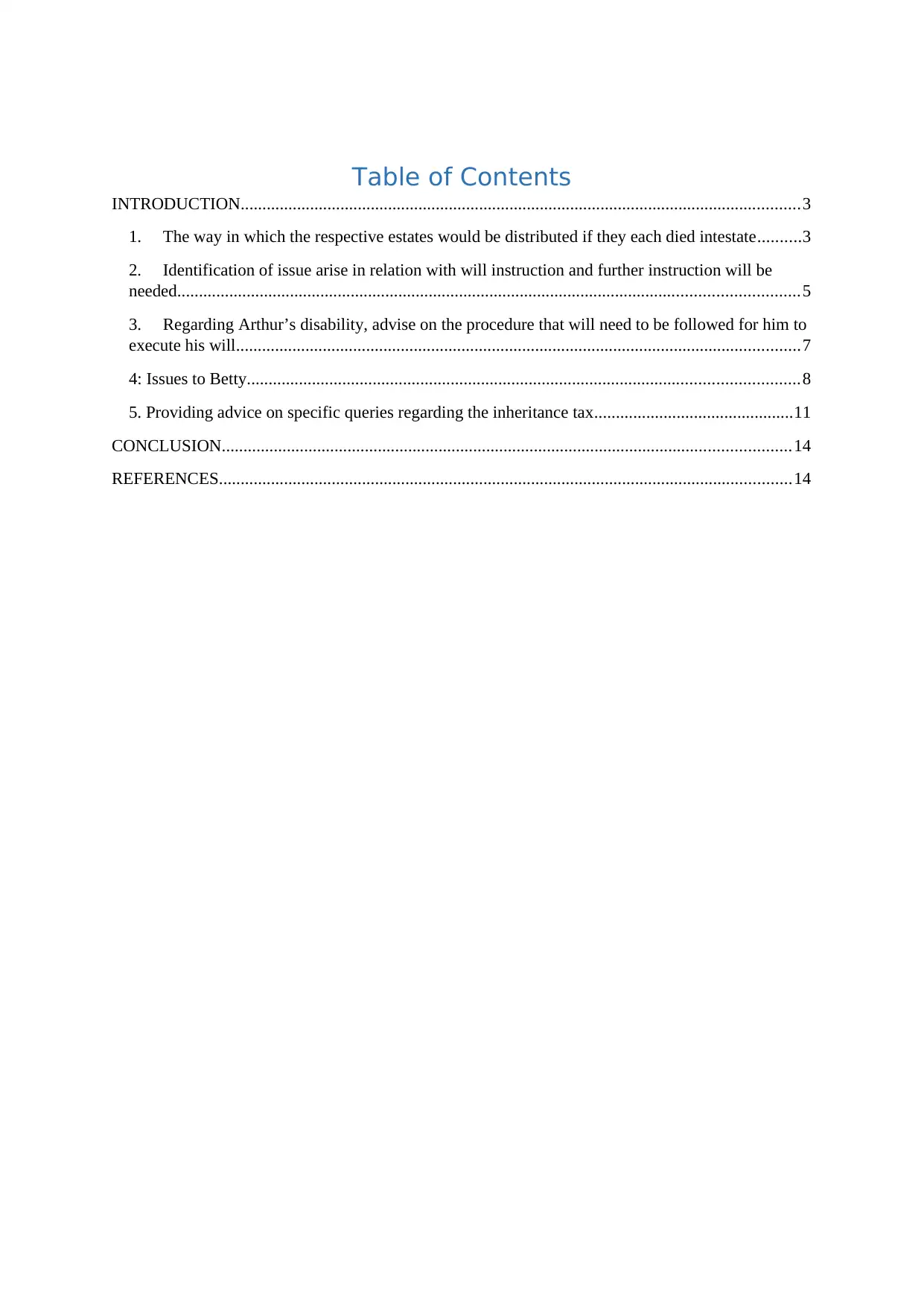
Table of Contents
INTRODUCTION.................................................................................................................................3
1. The way in which the respective estates would be distributed if they each died intestate..........3
2. Identification of issue arise in relation with will instruction and further instruction will be
needed...............................................................................................................................................5
3. Regarding Arthur’s disability, advise on the procedure that will need to be followed for him to
execute his will..................................................................................................................................7
4: Issues to Betty...............................................................................................................................8
5. Providing advice on specific queries regarding the inheritance tax..............................................11
CONCLUSION...................................................................................................................................14
REFERENCES....................................................................................................................................14
INTRODUCTION.................................................................................................................................3
1. The way in which the respective estates would be distributed if they each died intestate..........3
2. Identification of issue arise in relation with will instruction and further instruction will be
needed...............................................................................................................................................5
3. Regarding Arthur’s disability, advise on the procedure that will need to be followed for him to
execute his will..................................................................................................................................7
4: Issues to Betty...............................................................................................................................8
5. Providing advice on specific queries regarding the inheritance tax..............................................11
CONCLUSION...................................................................................................................................14
REFERENCES....................................................................................................................................14
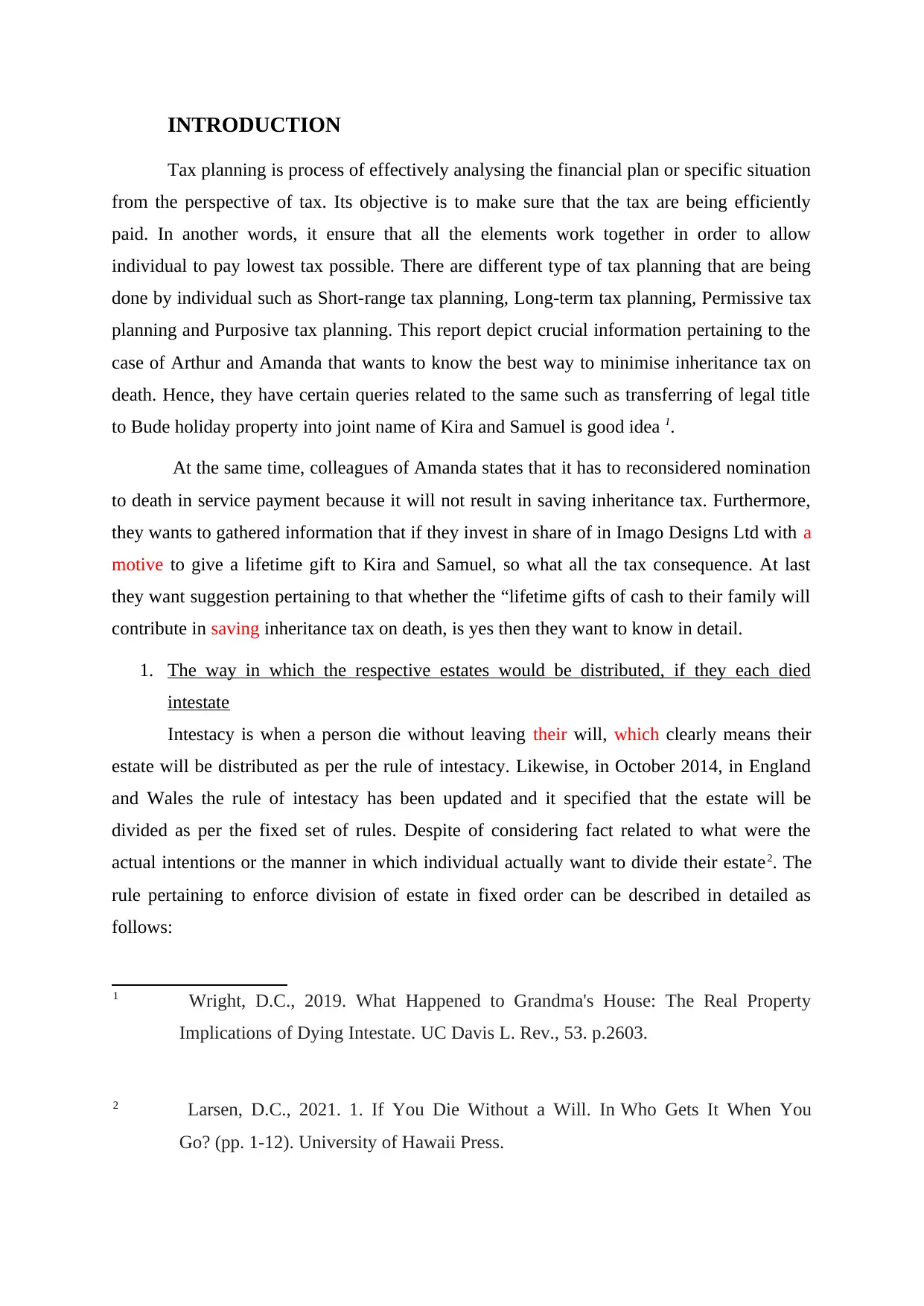
INTRODUCTION
Tax planning is process of effectively analysing the financial plan or specific situation
from the perspective of tax. Its objective is to make sure that the tax are being efficiently
paid. In another words, it ensure that all the elements work together in order to allow
individual to pay lowest tax possible. There are different type of tax planning that are being
done by individual such as Short-range tax planning, Long-term tax planning, Permissive tax
planning and Purposive tax planning. This report depict crucial information pertaining to the
case of Arthur and Amanda that wants to know the best way to minimise inheritance tax on
death. Hence, they have certain queries related to the same such as transferring of legal title
to Bude holiday property into joint name of Kira and Samuel is good idea 1.
At the same time, colleagues of Amanda states that it has to reconsidered nomination
to death in service payment because it will not result in saving inheritance tax. Furthermore,
they wants to gathered information that if they invest in share of in Imago Designs Ltd with a
motive to give a lifetime gift to Kira and Samuel, so what all the tax consequence. At last
they want suggestion pertaining to that whether the “lifetime gifts of cash to their family will
contribute in saving inheritance tax on death, is yes then they want to know in detail.
1. The way in which the respective estates would be distributed, if they each died
intestate
Intestacy is when a person die without leaving their will, which clearly means their
estate will be distributed as per the rule of intestacy. Likewise, in October 2014, in England
and Wales the rule of intestacy has been updated and it specified that the estate will be
divided as per the fixed set of rules. Despite of considering fact related to what were the
actual intentions or the manner in which individual actually want to divide their estate2. The
rule pertaining to enforce division of estate in fixed order can be described in detailed as
follows:
1 Wright, D.C., 2019. What Happened to Grandma's House: The Real Property
Implications of Dying Intestate. UC Davis L. Rev., 53. p.2603.
2 Larsen, D.C., 2021. 1. If You Die Without a Will. In Who Gets It When You
Go? (pp. 1-12). University of Hawaii Press.
Tax planning is process of effectively analysing the financial plan or specific situation
from the perspective of tax. Its objective is to make sure that the tax are being efficiently
paid. In another words, it ensure that all the elements work together in order to allow
individual to pay lowest tax possible. There are different type of tax planning that are being
done by individual such as Short-range tax planning, Long-term tax planning, Permissive tax
planning and Purposive tax planning. This report depict crucial information pertaining to the
case of Arthur and Amanda that wants to know the best way to minimise inheritance tax on
death. Hence, they have certain queries related to the same such as transferring of legal title
to Bude holiday property into joint name of Kira and Samuel is good idea 1.
At the same time, colleagues of Amanda states that it has to reconsidered nomination
to death in service payment because it will not result in saving inheritance tax. Furthermore,
they wants to gathered information that if they invest in share of in Imago Designs Ltd with a
motive to give a lifetime gift to Kira and Samuel, so what all the tax consequence. At last
they want suggestion pertaining to that whether the “lifetime gifts of cash to their family will
contribute in saving inheritance tax on death, is yes then they want to know in detail.
1. The way in which the respective estates would be distributed, if they each died
intestate
Intestacy is when a person die without leaving their will, which clearly means their
estate will be distributed as per the rule of intestacy. Likewise, in October 2014, in England
and Wales the rule of intestacy has been updated and it specified that the estate will be
divided as per the fixed set of rules. Despite of considering fact related to what were the
actual intentions or the manner in which individual actually want to divide their estate2. The
rule pertaining to enforce division of estate in fixed order can be described in detailed as
follows:
1 Wright, D.C., 2019. What Happened to Grandma's House: The Real Property
Implications of Dying Intestate. UC Davis L. Rev., 53. p.2603.
2 Larsen, D.C., 2021. 1. If You Die Without a Will. In Who Gets It When You
Go? (pp. 1-12). University of Hawaii Press.
⊘ This is a preview!⊘
Do you want full access?
Subscribe today to unlock all pages.

Trusted by 1+ million students worldwide
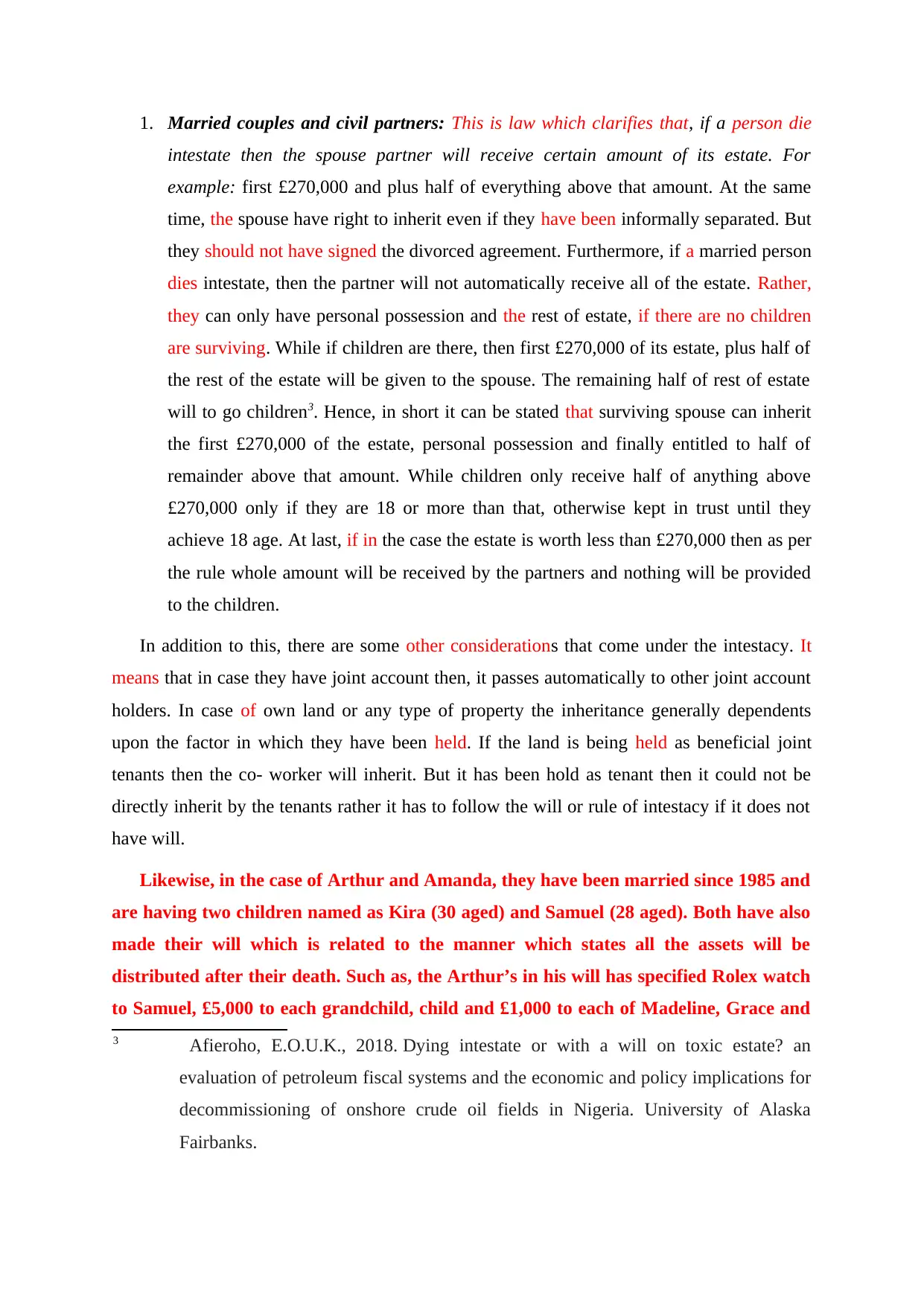
1. Married couples and civil partners: This is law which clarifies that, if a person die
intestate then the spouse partner will receive certain amount of its estate. For
example: first £270,000 and plus half of everything above that amount. At the same
time, the spouse have right to inherit even if they have been informally separated. But
they should not have signed the divorced agreement. Furthermore, if a married person
dies intestate, then the partner will not automatically receive all of the estate. Rather,
they can only have personal possession and the rest of estate, if there are no children
are surviving. While if children are there, then first £270,000 of its estate, plus half of
the rest of the estate will be given to the spouse. The remaining half of rest of estate
will to go children3. Hence, in short it can be stated that surviving spouse can inherit
the first £270,000 of the estate, personal possession and finally entitled to half of
remainder above that amount. While children only receive half of anything above
£270,000 only if they are 18 or more than that, otherwise kept in trust until they
achieve 18 age. At last, if in the case the estate is worth less than £270,000 then as per
the rule whole amount will be received by the partners and nothing will be provided
to the children.
In addition to this, there are some other considerations that come under the intestacy. It
means that in case they have joint account then, it passes automatically to other joint account
holders. In case of own land or any type of property the inheritance generally dependents
upon the factor in which they have been held. If the land is being held as beneficial joint
tenants then the co- worker will inherit. But it has been hold as tenant then it could not be
directly inherit by the tenants rather it has to follow the will or rule of intestacy if it does not
have will.
Likewise, in the case of Arthur and Amanda, they have been married since 1985 and
are having two children named as Kira (30 aged) and Samuel (28 aged). Both have also
made their will which is related to the manner which states all the assets will be
distributed after their death. Such as, the Arthur’s in his will has specified Rolex watch
to Samuel, £5,000 to each grandchild, child and £1,000 to each of Madeline, Grace and
3 Afieroho, E.O.U.K., 2018. Dying intestate or with a will on toxic estate? an
evaluation of petroleum fiscal systems and the economic and policy implications for
decommissioning of onshore crude oil fields in Nigeria. University of Alaska
Fairbanks.
intestate then the spouse partner will receive certain amount of its estate. For
example: first £270,000 and plus half of everything above that amount. At the same
time, the spouse have right to inherit even if they have been informally separated. But
they should not have signed the divorced agreement. Furthermore, if a married person
dies intestate, then the partner will not automatically receive all of the estate. Rather,
they can only have personal possession and the rest of estate, if there are no children
are surviving. While if children are there, then first £270,000 of its estate, plus half of
the rest of the estate will be given to the spouse. The remaining half of rest of estate
will to go children3. Hence, in short it can be stated that surviving spouse can inherit
the first £270,000 of the estate, personal possession and finally entitled to half of
remainder above that amount. While children only receive half of anything above
£270,000 only if they are 18 or more than that, otherwise kept in trust until they
achieve 18 age. At last, if in the case the estate is worth less than £270,000 then as per
the rule whole amount will be received by the partners and nothing will be provided
to the children.
In addition to this, there are some other considerations that come under the intestacy. It
means that in case they have joint account then, it passes automatically to other joint account
holders. In case of own land or any type of property the inheritance generally dependents
upon the factor in which they have been held. If the land is being held as beneficial joint
tenants then the co- worker will inherit. But it has been hold as tenant then it could not be
directly inherit by the tenants rather it has to follow the will or rule of intestacy if it does not
have will.
Likewise, in the case of Arthur and Amanda, they have been married since 1985 and
are having two children named as Kira (30 aged) and Samuel (28 aged). Both have also
made their will which is related to the manner which states all the assets will be
distributed after their death. Such as, the Arthur’s in his will has specified Rolex watch
to Samuel, £5,000 to each grandchild, child and £1,000 to each of Madeline, Grace and
3 Afieroho, E.O.U.K., 2018. Dying intestate or with a will on toxic estate? an
evaluation of petroleum fiscal systems and the economic and policy implications for
decommissioning of onshore crude oil fields in Nigeria. University of Alaska
Fairbanks.
Paraphrase This Document
Need a fresh take? Get an instant paraphrase of this document with our AI Paraphraser
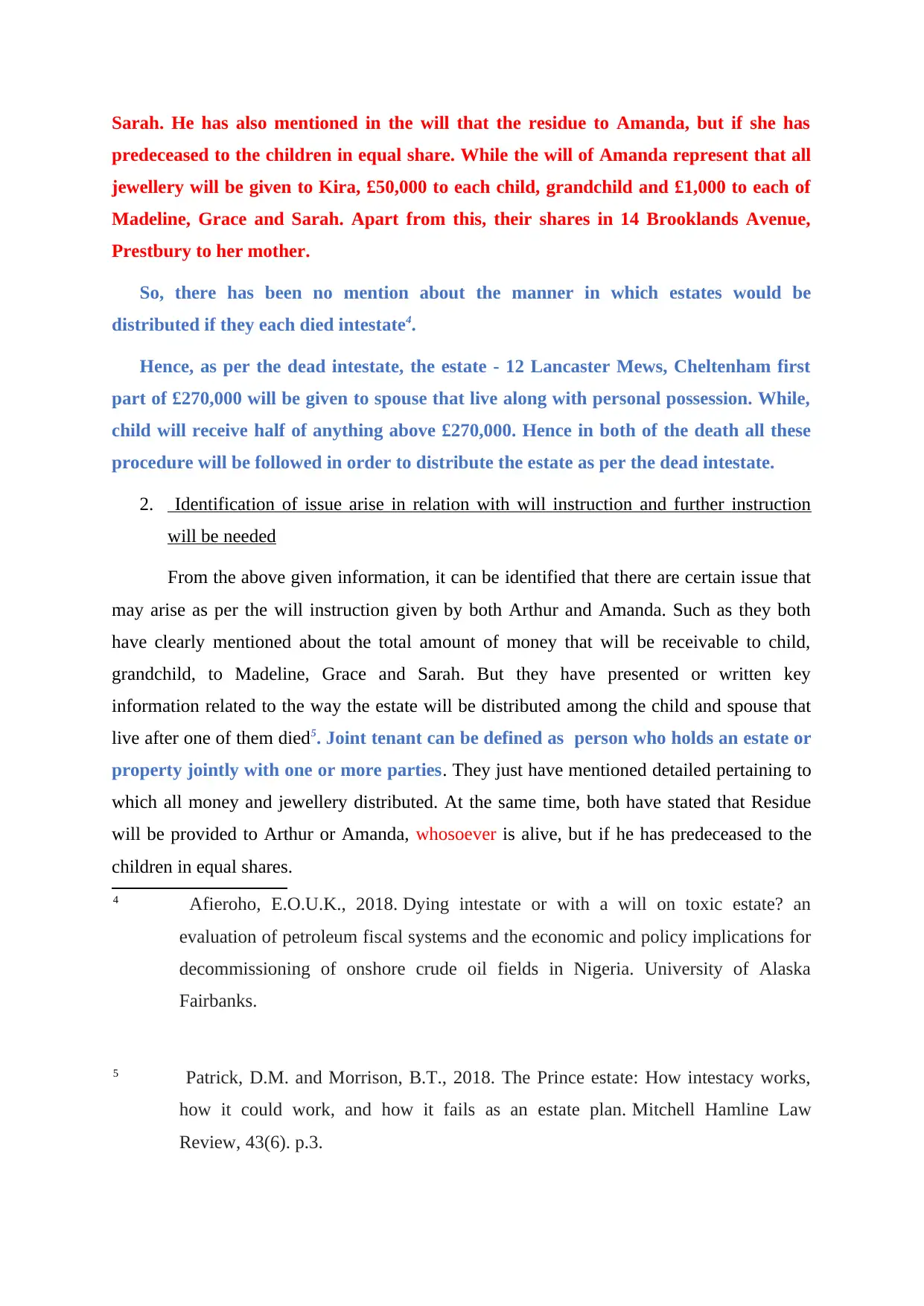
Sarah. He has also mentioned in the will that the residue to Amanda, but if she has
predeceased to the children in equal share. While the will of Amanda represent that all
jewellery will be given to Kira, £50,000 to each child, grandchild and £1,000 to each of
Madeline, Grace and Sarah. Apart from this, their shares in 14 Brooklands Avenue,
Prestbury to her mother.
So, there has been no mention about the manner in which estates would be
distributed if they each died intestate4.
Hence, as per the dead intestate, the estate - 12 Lancaster Mews, Cheltenham first
part of £270,000 will be given to spouse that live along with personal possession. While,
child will receive half of anything above £270,000. Hence in both of the death all these
procedure will be followed in order to distribute the estate as per the dead intestate.
2. Identification of issue arise in relation with will instruction and further instruction
will be needed
From the above given information, it can be identified that there are certain issue that
may arise as per the will instruction given by both Arthur and Amanda. Such as they both
have clearly mentioned about the total amount of money that will be receivable to child,
grandchild, to Madeline, Grace and Sarah. But they have presented or written key
information related to the way the estate will be distributed among the child and spouse that
live after one of them died5. Joint tenant can be defined as person who holds an estate or
property jointly with one or more parties. They just have mentioned detailed pertaining to
which all money and jewellery distributed. At the same time, both have stated that Residue
will be provided to Arthur or Amanda, whosoever is alive, but if he has predeceased to the
children in equal shares.
4 Afieroho, E.O.U.K., 2018. Dying intestate or with a will on toxic estate? an
evaluation of petroleum fiscal systems and the economic and policy implications for
decommissioning of onshore crude oil fields in Nigeria. University of Alaska
Fairbanks.
5 Patrick, D.M. and Morrison, B.T., 2018. The Prince estate: How intestacy works,
how it could work, and how it fails as an estate plan. Mitchell Hamline Law
Review, 43(6). p.3.
predeceased to the children in equal share. While the will of Amanda represent that all
jewellery will be given to Kira, £50,000 to each child, grandchild and £1,000 to each of
Madeline, Grace and Sarah. Apart from this, their shares in 14 Brooklands Avenue,
Prestbury to her mother.
So, there has been no mention about the manner in which estates would be
distributed if they each died intestate4.
Hence, as per the dead intestate, the estate - 12 Lancaster Mews, Cheltenham first
part of £270,000 will be given to spouse that live along with personal possession. While,
child will receive half of anything above £270,000. Hence in both of the death all these
procedure will be followed in order to distribute the estate as per the dead intestate.
2. Identification of issue arise in relation with will instruction and further instruction
will be needed
From the above given information, it can be identified that there are certain issue that
may arise as per the will instruction given by both Arthur and Amanda. Such as they both
have clearly mentioned about the total amount of money that will be receivable to child,
grandchild, to Madeline, Grace and Sarah. But they have presented or written key
information related to the way the estate will be distributed among the child and spouse that
live after one of them died5. Joint tenant can be defined as person who holds an estate or
property jointly with one or more parties. They just have mentioned detailed pertaining to
which all money and jewellery distributed. At the same time, both have stated that Residue
will be provided to Arthur or Amanda, whosoever is alive, but if he has predeceased to the
children in equal shares.
4 Afieroho, E.O.U.K., 2018. Dying intestate or with a will on toxic estate? an
evaluation of petroleum fiscal systems and the economic and policy implications for
decommissioning of onshore crude oil fields in Nigeria. University of Alaska
Fairbanks.
5 Patrick, D.M. and Morrison, B.T., 2018. The Prince estate: How intestacy works,
how it could work, and how it fails as an estate plan. Mitchell Hamline Law
Review, 43(6). p.3.
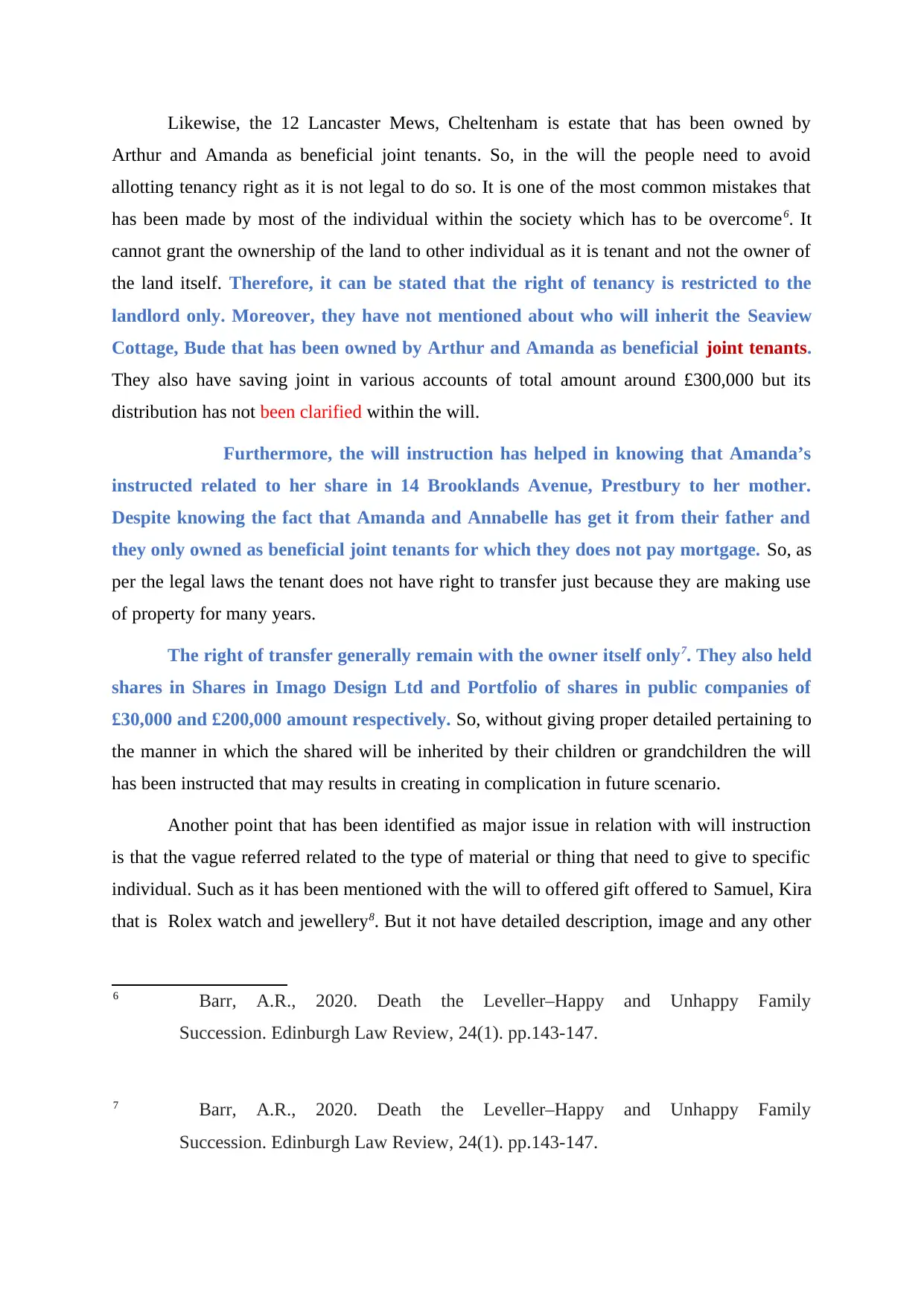
Likewise, the 12 Lancaster Mews, Cheltenham is estate that has been owned by
Arthur and Amanda as beneficial joint tenants. So, in the will the people need to avoid
allotting tenancy right as it is not legal to do so. It is one of the most common mistakes that
has been made by most of the individual within the society which has to be overcome6. It
cannot grant the ownership of the land to other individual as it is tenant and not the owner of
the land itself. Therefore, it can be stated that the right of tenancy is restricted to the
landlord only. Moreover, they have not mentioned about who will inherit the Seaview
Cottage, Bude that has been owned by Arthur and Amanda as beneficial joint tenants.
They also have saving joint in various accounts of total amount around £300,000 but its
distribution has not been clarified within the will.
Furthermore, the will instruction has helped in knowing that Amanda’s
instructed related to her share in 14 Brooklands Avenue, Prestbury to her mother.
Despite knowing the fact that Amanda and Annabelle has get it from their father and
they only owned as beneficial joint tenants for which they does not pay mortgage. So, as
per the legal laws the tenant does not have right to transfer just because they are making use
of property for many years.
The right of transfer generally remain with the owner itself only7. They also held
shares in Shares in Imago Design Ltd and Portfolio of shares in public companies of
£30,000 and £200,000 amount respectively. So, without giving proper detailed pertaining to
the manner in which the shared will be inherited by their children or grandchildren the will
has been instructed that may results in creating in complication in future scenario.
Another point that has been identified as major issue in relation with will instruction
is that the vague referred related to the type of material or thing that need to give to specific
individual. Such as it has been mentioned with the will to offered gift offered to Samuel, Kira
that is Rolex watch and jewellery8. But it not have detailed description, image and any other
6 Barr, A.R., 2020. Death the Leveller–Happy and Unhappy Family
Succession. Edinburgh Law Review, 24(1). pp.143-147.
7 Barr, A.R., 2020. Death the Leveller–Happy and Unhappy Family
Succession. Edinburgh Law Review, 24(1). pp.143-147.
Arthur and Amanda as beneficial joint tenants. So, in the will the people need to avoid
allotting tenancy right as it is not legal to do so. It is one of the most common mistakes that
has been made by most of the individual within the society which has to be overcome6. It
cannot grant the ownership of the land to other individual as it is tenant and not the owner of
the land itself. Therefore, it can be stated that the right of tenancy is restricted to the
landlord only. Moreover, they have not mentioned about who will inherit the Seaview
Cottage, Bude that has been owned by Arthur and Amanda as beneficial joint tenants.
They also have saving joint in various accounts of total amount around £300,000 but its
distribution has not been clarified within the will.
Furthermore, the will instruction has helped in knowing that Amanda’s
instructed related to her share in 14 Brooklands Avenue, Prestbury to her mother.
Despite knowing the fact that Amanda and Annabelle has get it from their father and
they only owned as beneficial joint tenants for which they does not pay mortgage. So, as
per the legal laws the tenant does not have right to transfer just because they are making use
of property for many years.
The right of transfer generally remain with the owner itself only7. They also held
shares in Shares in Imago Design Ltd and Portfolio of shares in public companies of
£30,000 and £200,000 amount respectively. So, without giving proper detailed pertaining to
the manner in which the shared will be inherited by their children or grandchildren the will
has been instructed that may results in creating in complication in future scenario.
Another point that has been identified as major issue in relation with will instruction
is that the vague referred related to the type of material or thing that need to give to specific
individual. Such as it has been mentioned with the will to offered gift offered to Samuel, Kira
that is Rolex watch and jewellery8. But it not have detailed description, image and any other
6 Barr, A.R., 2020. Death the Leveller–Happy and Unhappy Family
Succession. Edinburgh Law Review, 24(1). pp.143-147.
7 Barr, A.R., 2020. Death the Leveller–Happy and Unhappy Family
Succession. Edinburgh Law Review, 24(1). pp.143-147.
⊘ This is a preview!⊘
Do you want full access?
Subscribe today to unlock all pages.

Trusted by 1+ million students worldwide
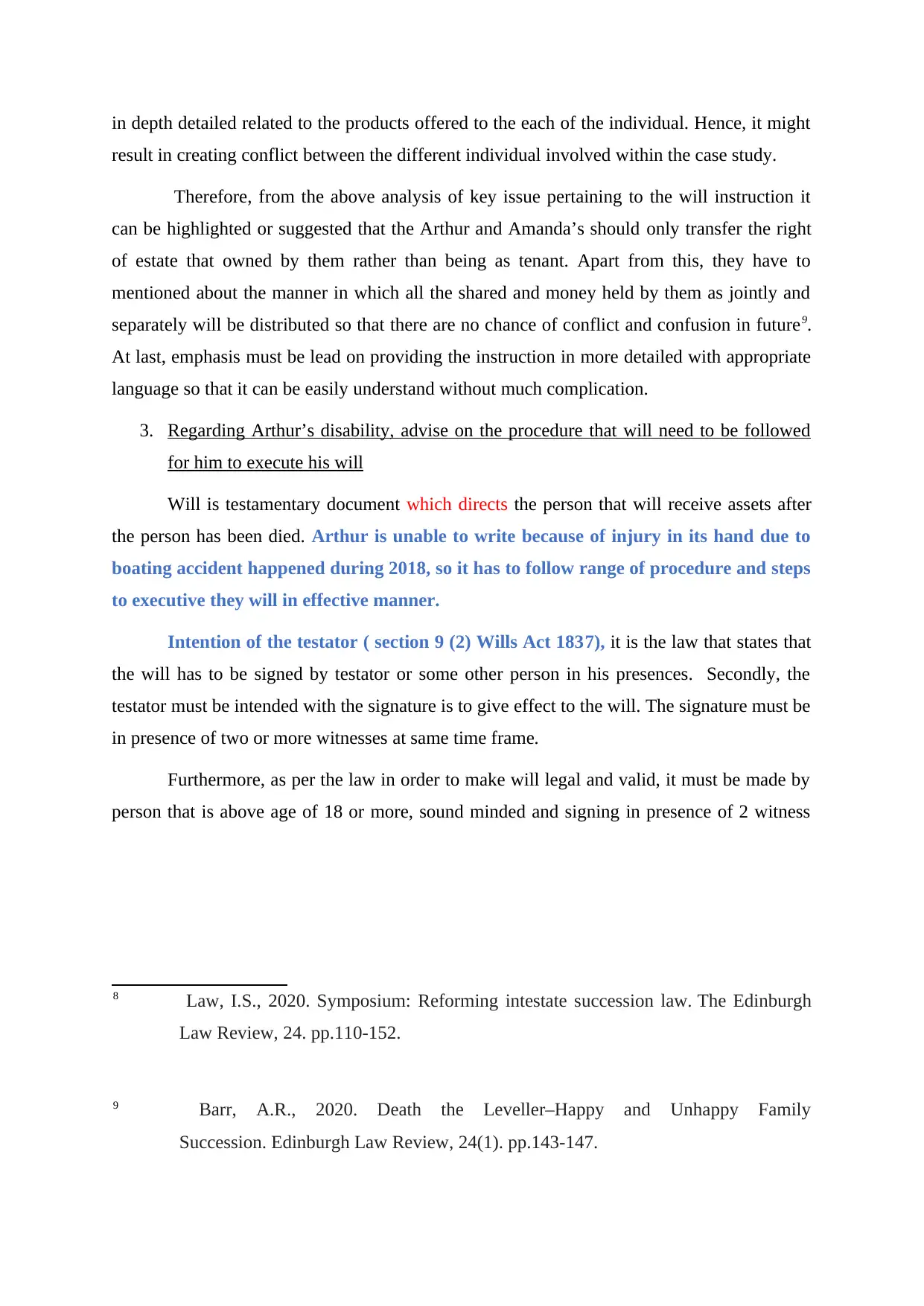
in depth detailed related to the products offered to the each of the individual. Hence, it might
result in creating conflict between the different individual involved within the case study.
Therefore, from the above analysis of key issue pertaining to the will instruction it
can be highlighted or suggested that the Arthur and Amanda’s should only transfer the right
of estate that owned by them rather than being as tenant. Apart from this, they have to
mentioned about the manner in which all the shared and money held by them as jointly and
separately will be distributed so that there are no chance of conflict and confusion in future9.
At last, emphasis must be lead on providing the instruction in more detailed with appropriate
language so that it can be easily understand without much complication.
3. Regarding Arthur’s disability, advise on the procedure that will need to be followed
for him to execute his will
Will is testamentary document which directs the person that will receive assets after
the person has been died. Arthur is unable to write because of injury in its hand due to
boating accident happened during 2018, so it has to follow range of procedure and steps
to executive they will in effective manner.
Intention of the testator ( section 9 (2) Wills Act 1837), it is the law that states that
the will has to be signed by testator or some other person in his presences. Secondly, the
testator must be intended with the signature is to give effect to the will. The signature must be
in presence of two or more witnesses at same time frame.
Furthermore, as per the law in order to make will legal and valid, it must be made by
person that is above age of 18 or more, sound minded and signing in presence of 2 witness
8 Law, I.S., 2020. Symposium: Reforming intestate succession law. The Edinburgh
Law Review, 24. pp.110-152.
9 Barr, A.R., 2020. Death the Leveller–Happy and Unhappy Family
Succession. Edinburgh Law Review, 24(1). pp.143-147.
result in creating conflict between the different individual involved within the case study.
Therefore, from the above analysis of key issue pertaining to the will instruction it
can be highlighted or suggested that the Arthur and Amanda’s should only transfer the right
of estate that owned by them rather than being as tenant. Apart from this, they have to
mentioned about the manner in which all the shared and money held by them as jointly and
separately will be distributed so that there are no chance of conflict and confusion in future9.
At last, emphasis must be lead on providing the instruction in more detailed with appropriate
language so that it can be easily understand without much complication.
3. Regarding Arthur’s disability, advise on the procedure that will need to be followed
for him to execute his will
Will is testamentary document which directs the person that will receive assets after
the person has been died. Arthur is unable to write because of injury in its hand due to
boating accident happened during 2018, so it has to follow range of procedure and steps
to executive they will in effective manner.
Intention of the testator ( section 9 (2) Wills Act 1837), it is the law that states that
the will has to be signed by testator or some other person in his presences. Secondly, the
testator must be intended with the signature is to give effect to the will. The signature must be
in presence of two or more witnesses at same time frame.
Furthermore, as per the law in order to make will legal and valid, it must be made by
person that is above age of 18 or more, sound minded and signing in presence of 2 witness
8 Law, I.S., 2020. Symposium: Reforming intestate succession law. The Edinburgh
Law Review, 24. pp.110-152.
9 Barr, A.R., 2020. Death the Leveller–Happy and Unhappy Family
Succession. Edinburgh Law Review, 24(1). pp.143-147.
Paraphrase This Document
Need a fresh take? Get an instant paraphrase of this document with our AI Paraphraser
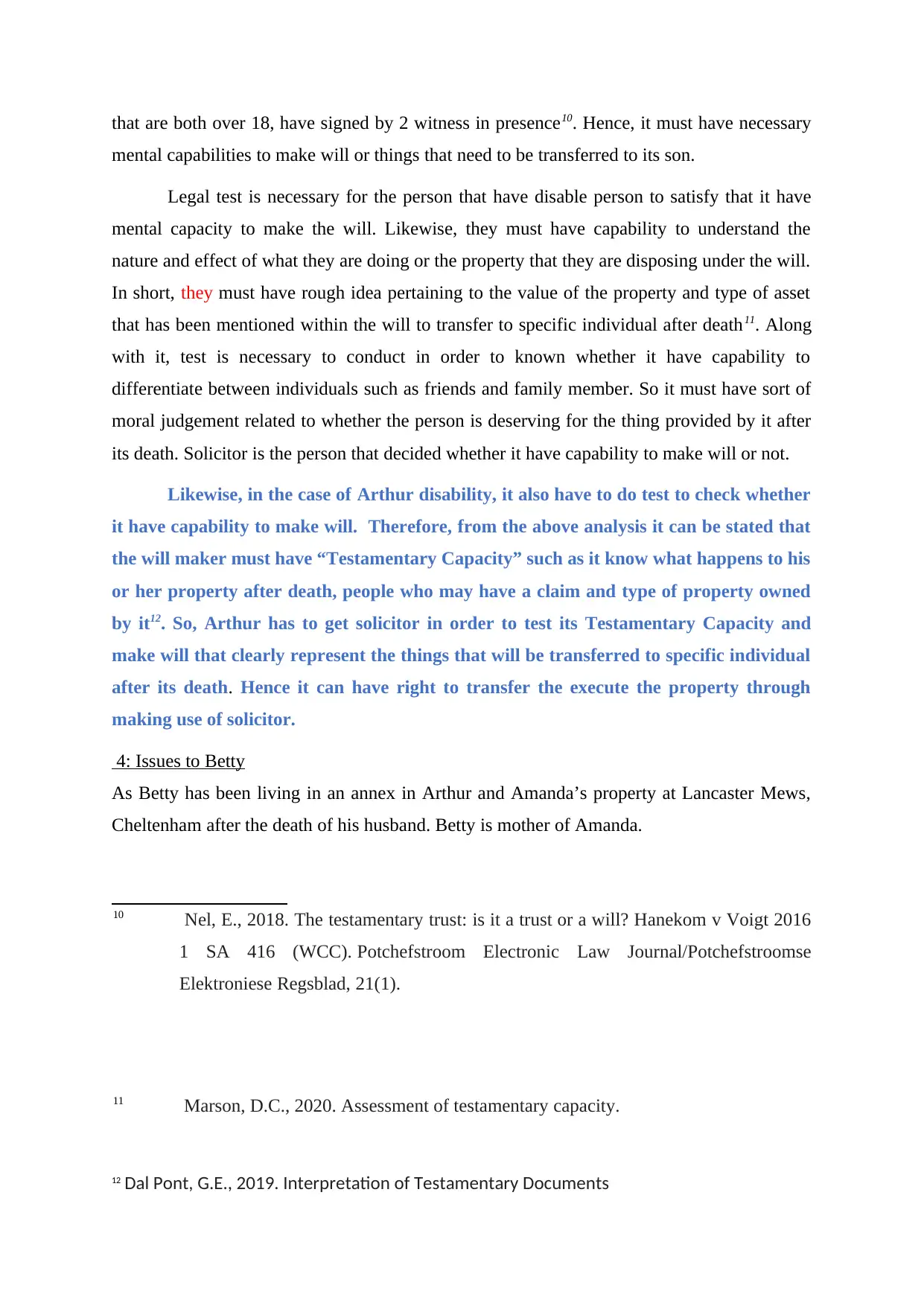
that are both over 18, have signed by 2 witness in presence10. Hence, it must have necessary
mental capabilities to make will or things that need to be transferred to its son.
Legal test is necessary for the person that have disable person to satisfy that it have
mental capacity to make the will. Likewise, they must have capability to understand the
nature and effect of what they are doing or the property that they are disposing under the will.
In short, they must have rough idea pertaining to the value of the property and type of asset
that has been mentioned within the will to transfer to specific individual after death11. Along
with it, test is necessary to conduct in order to known whether it have capability to
differentiate between individuals such as friends and family member. So it must have sort of
moral judgement related to whether the person is deserving for the thing provided by it after
its death. Solicitor is the person that decided whether it have capability to make will or not.
Likewise, in the case of Arthur disability, it also have to do test to check whether
it have capability to make will. Therefore, from the above analysis it can be stated that
the will maker must have “Testamentary Capacity” such as it know what happens to his
or her property after death, people who may have a claim and type of property owned
by it12. So, Arthur has to get solicitor in order to test its Testamentary Capacity and
make will that clearly represent the things that will be transferred to specific individual
after its death. Hence it can have right to transfer the execute the property through
making use of solicitor.
4: Issues to Betty
As Betty has been living in an annex in Arthur and Amanda’s property at Lancaster Mews,
Cheltenham after the death of his husband. Betty is mother of Amanda.
10 Nel, E., 2018. The testamentary trust: is it a trust or a will? Hanekom v Voigt 2016
1 SA 416 (WCC). Potchefstroom Electronic Law Journal/Potchefstroomse
Elektroniese Regsblad, 21(1).
11 Marson, D.C., 2020. Assessment of testamentary capacity.
12 Dal Pont, G.E., 2019. Interpretation of Testamentary Documents
mental capabilities to make will or things that need to be transferred to its son.
Legal test is necessary for the person that have disable person to satisfy that it have
mental capacity to make the will. Likewise, they must have capability to understand the
nature and effect of what they are doing or the property that they are disposing under the will.
In short, they must have rough idea pertaining to the value of the property and type of asset
that has been mentioned within the will to transfer to specific individual after death11. Along
with it, test is necessary to conduct in order to known whether it have capability to
differentiate between individuals such as friends and family member. So it must have sort of
moral judgement related to whether the person is deserving for the thing provided by it after
its death. Solicitor is the person that decided whether it have capability to make will or not.
Likewise, in the case of Arthur disability, it also have to do test to check whether
it have capability to make will. Therefore, from the above analysis it can be stated that
the will maker must have “Testamentary Capacity” such as it know what happens to his
or her property after death, people who may have a claim and type of property owned
by it12. So, Arthur has to get solicitor in order to test its Testamentary Capacity and
make will that clearly represent the things that will be transferred to specific individual
after its death. Hence it can have right to transfer the execute the property through
making use of solicitor.
4: Issues to Betty
As Betty has been living in an annex in Arthur and Amanda’s property at Lancaster Mews,
Cheltenham after the death of his husband. Betty is mother of Amanda.
10 Nel, E., 2018. The testamentary trust: is it a trust or a will? Hanekom v Voigt 2016
1 SA 416 (WCC). Potchefstroom Electronic Law Journal/Potchefstroomse
Elektroniese Regsblad, 21(1).
11 Marson, D.C., 2020. Assessment of testamentary capacity.
12 Dal Pont, G.E., 2019. Interpretation of Testamentary Documents
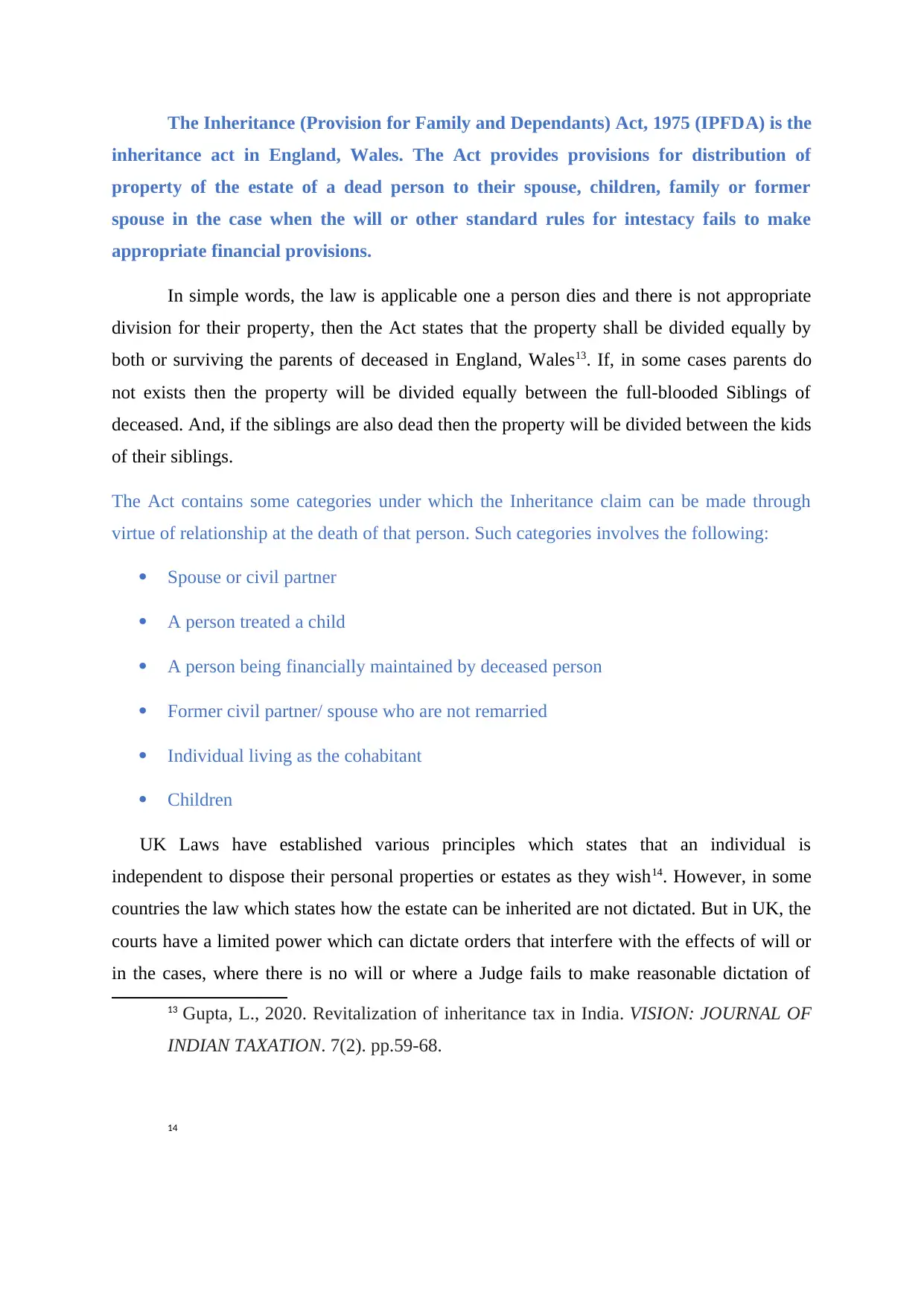
The Inheritance (Provision for Family and Dependants) Act, 1975 (IPFDA) is the
inheritance act in England, Wales. The Act provides provisions for distribution of
property of the estate of a dead person to their spouse, children, family or former
spouse in the case when the will or other standard rules for intestacy fails to make
appropriate financial provisions.
In simple words, the law is applicable one a person dies and there is not appropriate
division for their property, then the Act states that the property shall be divided equally by
both or surviving the parents of deceased in England, Wales13. If, in some cases parents do
not exists then the property will be divided equally between the full-blooded Siblings of
deceased. And, if the siblings are also dead then the property will be divided between the kids
of their siblings.
The Act contains some categories under which the Inheritance claim can be made through
virtue of relationship at the death of that person. Such categories involves the following:
Spouse or civil partner
A person treated a child
A person being financially maintained by deceased person
Former civil partner/ spouse who are not remarried
Individual living as the cohabitant
Children
UK Laws have established various principles which states that an individual is
independent to dispose their personal properties or estates as they wish14. However, in some
countries the law which states how the estate can be inherited are not dictated. But in UK, the
courts have a limited power which can dictate orders that interfere with the effects of will or
in the cases, where there is no will or where a Judge fails to make reasonable dictation of
13 Gupta, L., 2020. Revitalization of inheritance tax in India. VISION: JOURNAL OF
INDIAN TAXATION. 7(2). pp.59-68.
14
inheritance act in England, Wales. The Act provides provisions for distribution of
property of the estate of a dead person to their spouse, children, family or former
spouse in the case when the will or other standard rules for intestacy fails to make
appropriate financial provisions.
In simple words, the law is applicable one a person dies and there is not appropriate
division for their property, then the Act states that the property shall be divided equally by
both or surviving the parents of deceased in England, Wales13. If, in some cases parents do
not exists then the property will be divided equally between the full-blooded Siblings of
deceased. And, if the siblings are also dead then the property will be divided between the kids
of their siblings.
The Act contains some categories under which the Inheritance claim can be made through
virtue of relationship at the death of that person. Such categories involves the following:
Spouse or civil partner
A person treated a child
A person being financially maintained by deceased person
Former civil partner/ spouse who are not remarried
Individual living as the cohabitant
Children
UK Laws have established various principles which states that an individual is
independent to dispose their personal properties or estates as they wish14. However, in some
countries the law which states how the estate can be inherited are not dictated. But in UK, the
courts have a limited power which can dictate orders that interfere with the effects of will or
in the cases, where there is no will or where a Judge fails to make reasonable dictation of
13 Gupta, L., 2020. Revitalization of inheritance tax in India. VISION: JOURNAL OF
INDIAN TAXATION. 7(2). pp.59-68.
14
⊘ This is a preview!⊘
Do you want full access?
Subscribe today to unlock all pages.

Trusted by 1+ million students worldwide
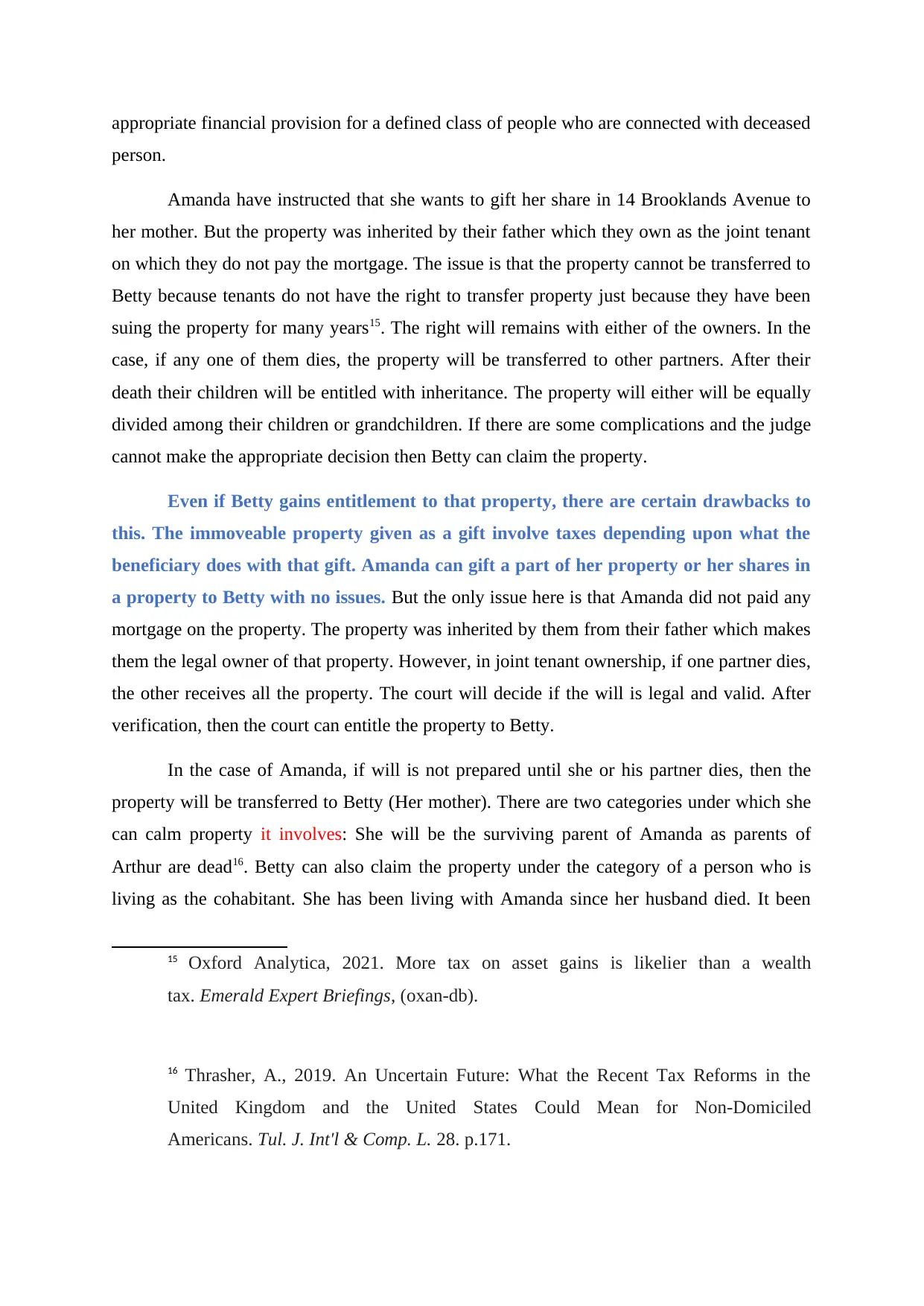
appropriate financial provision for a defined class of people who are connected with deceased
person.
Amanda have instructed that she wants to gift her share in 14 Brooklands Avenue to
her mother. But the property was inherited by their father which they own as the joint tenant
on which they do not pay the mortgage. The issue is that the property cannot be transferred to
Betty because tenants do not have the right to transfer property just because they have been
suing the property for many years15. The right will remains with either of the owners. In the
case, if any one of them dies, the property will be transferred to other partners. After their
death their children will be entitled with inheritance. The property will either will be equally
divided among their children or grandchildren. If there are some complications and the judge
cannot make the appropriate decision then Betty can claim the property.
Even if Betty gains entitlement to that property, there are certain drawbacks to
this. The immoveable property given as a gift involve taxes depending upon what the
beneficiary does with that gift. Amanda can gift a part of her property or her shares in
a property to Betty with no issues. But the only issue here is that Amanda did not paid any
mortgage on the property. The property was inherited by them from their father which makes
them the legal owner of that property. However, in joint tenant ownership, if one partner dies,
the other receives all the property. The court will decide if the will is legal and valid. After
verification, then the court can entitle the property to Betty.
In the case of Amanda, if will is not prepared until she or his partner dies, then the
property will be transferred to Betty (Her mother). There are two categories under which she
can calm property it involves: She will be the surviving parent of Amanda as parents of
Arthur are dead16. Betty can also claim the property under the category of a person who is
living as the cohabitant. She has been living with Amanda since her husband died. It been
15 Oxford Analytica, 2021. More tax on asset gains is likelier than a wealth
tax. Emerald Expert Briefings, (oxan-db).
16 Thrasher, A., 2019. An Uncertain Future: What the Recent Tax Reforms in the
United Kingdom and the United States Could Mean for Non-Domiciled
Americans. Tul. J. Int'l & Comp. L. 28. p.171.
person.
Amanda have instructed that she wants to gift her share in 14 Brooklands Avenue to
her mother. But the property was inherited by their father which they own as the joint tenant
on which they do not pay the mortgage. The issue is that the property cannot be transferred to
Betty because tenants do not have the right to transfer property just because they have been
suing the property for many years15. The right will remains with either of the owners. In the
case, if any one of them dies, the property will be transferred to other partners. After their
death their children will be entitled with inheritance. The property will either will be equally
divided among their children or grandchildren. If there are some complications and the judge
cannot make the appropriate decision then Betty can claim the property.
Even if Betty gains entitlement to that property, there are certain drawbacks to
this. The immoveable property given as a gift involve taxes depending upon what the
beneficiary does with that gift. Amanda can gift a part of her property or her shares in
a property to Betty with no issues. But the only issue here is that Amanda did not paid any
mortgage on the property. The property was inherited by them from their father which makes
them the legal owner of that property. However, in joint tenant ownership, if one partner dies,
the other receives all the property. The court will decide if the will is legal and valid. After
verification, then the court can entitle the property to Betty.
In the case of Amanda, if will is not prepared until she or his partner dies, then the
property will be transferred to Betty (Her mother). There are two categories under which she
can calm property it involves: She will be the surviving parent of Amanda as parents of
Arthur are dead16. Betty can also claim the property under the category of a person who is
living as the cohabitant. She has been living with Amanda since her husband died. It been
15 Oxford Analytica, 2021. More tax on asset gains is likelier than a wealth
tax. Emerald Expert Briefings, (oxan-db).
16 Thrasher, A., 2019. An Uncertain Future: What the Recent Tax Reforms in the
United Kingdom and the United States Could Mean for Non-Domiciled
Americans. Tul. J. Int'l & Comp. L. 28. p.171.
Paraphrase This Document
Need a fresh take? Get an instant paraphrase of this document with our AI Paraphraser
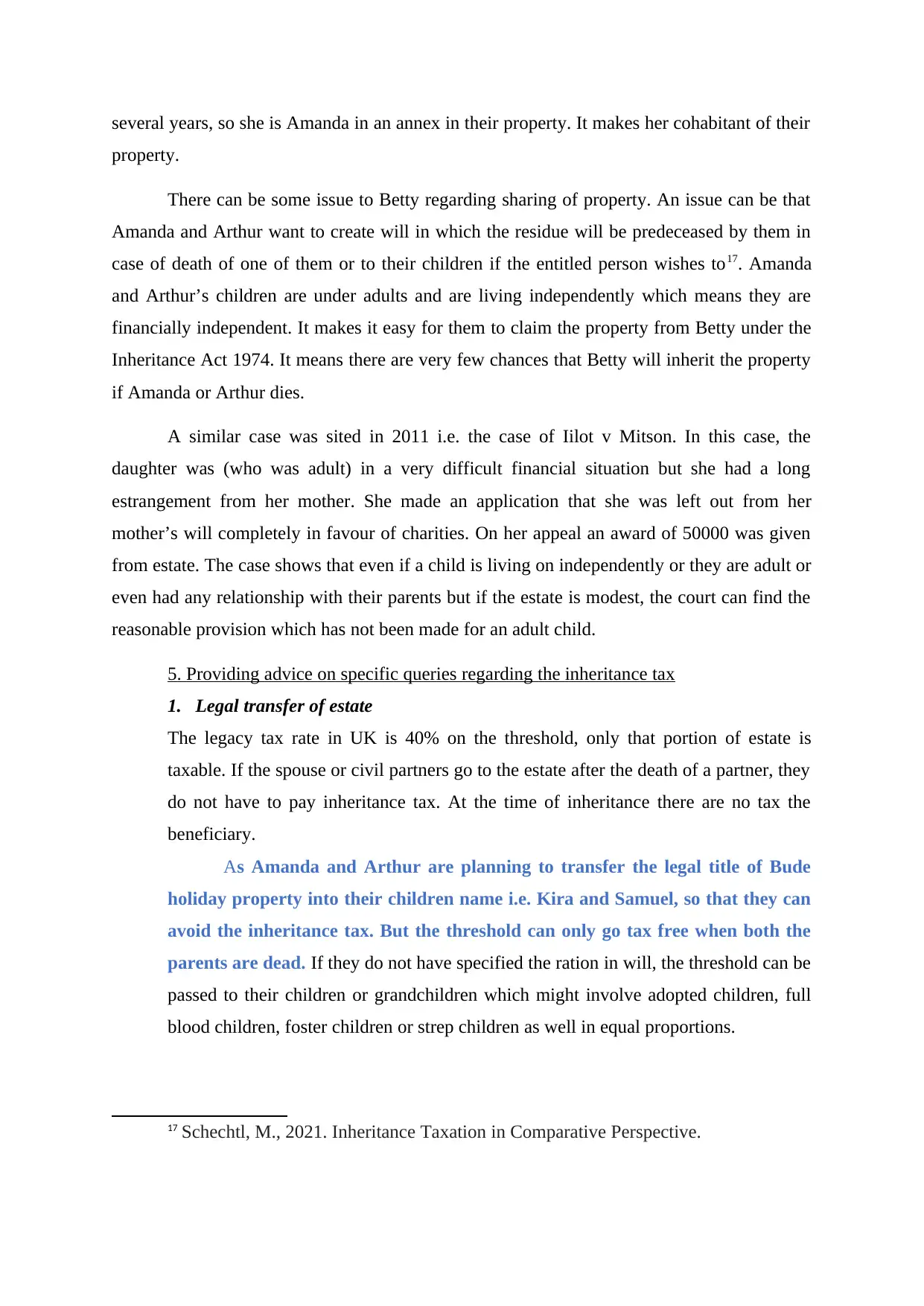
several years, so she is Amanda in an annex in their property. It makes her cohabitant of their
property.
There can be some issue to Betty regarding sharing of property. An issue can be that
Amanda and Arthur want to create will in which the residue will be predeceased by them in
case of death of one of them or to their children if the entitled person wishes to17. Amanda
and Arthur’s children are under adults and are living independently which means they are
financially independent. It makes it easy for them to claim the property from Betty under the
Inheritance Act 1974. It means there are very few chances that Betty will inherit the property
if Amanda or Arthur dies.
A similar case was sited in 2011 i.e. the case of Iilot v Mitson. In this case, the
daughter was (who was adult) in a very difficult financial situation but she had a long
estrangement from her mother. She made an application that she was left out from her
mother’s will completely in favour of charities. On her appeal an award of 50000 was given
from estate. The case shows that even if a child is living on independently or they are adult or
even had any relationship with their parents but if the estate is modest, the court can find the
reasonable provision which has not been made for an adult child.
5. Providing advice on specific queries regarding the inheritance tax
1. Legal transfer of estate
The legacy tax rate in UK is 40% on the threshold, only that portion of estate is
taxable. If the spouse or civil partners go to the estate after the death of a partner, they
do not have to pay inheritance tax. At the time of inheritance there are no tax the
beneficiary.
As Amanda and Arthur are planning to transfer the legal title of Bude
holiday property into their children name i.e. Kira and Samuel, so that they can
avoid the inheritance tax. But the threshold can only go tax free when both the
parents are dead. If they do not have specified the ration in will, the threshold can be
passed to their children or grandchildren which might involve adopted children, full
blood children, foster children or strep children as well in equal proportions.
17 Schechtl, M., 2021. Inheritance Taxation in Comparative Perspective.
property.
There can be some issue to Betty regarding sharing of property. An issue can be that
Amanda and Arthur want to create will in which the residue will be predeceased by them in
case of death of one of them or to their children if the entitled person wishes to17. Amanda
and Arthur’s children are under adults and are living independently which means they are
financially independent. It makes it easy for them to claim the property from Betty under the
Inheritance Act 1974. It means there are very few chances that Betty will inherit the property
if Amanda or Arthur dies.
A similar case was sited in 2011 i.e. the case of Iilot v Mitson. In this case, the
daughter was (who was adult) in a very difficult financial situation but she had a long
estrangement from her mother. She made an application that she was left out from her
mother’s will completely in favour of charities. On her appeal an award of 50000 was given
from estate. The case shows that even if a child is living on independently or they are adult or
even had any relationship with their parents but if the estate is modest, the court can find the
reasonable provision which has not been made for an adult child.
5. Providing advice on specific queries regarding the inheritance tax
1. Legal transfer of estate
The legacy tax rate in UK is 40% on the threshold, only that portion of estate is
taxable. If the spouse or civil partners go to the estate after the death of a partner, they
do not have to pay inheritance tax. At the time of inheritance there are no tax the
beneficiary.
As Amanda and Arthur are planning to transfer the legal title of Bude
holiday property into their children name i.e. Kira and Samuel, so that they can
avoid the inheritance tax. But the threshold can only go tax free when both the
parents are dead. If they do not have specified the ration in will, the threshold can be
passed to their children or grandchildren which might involve adopted children, full
blood children, foster children or strep children as well in equal proportions.
17 Schechtl, M., 2021. Inheritance Taxation in Comparative Perspective.
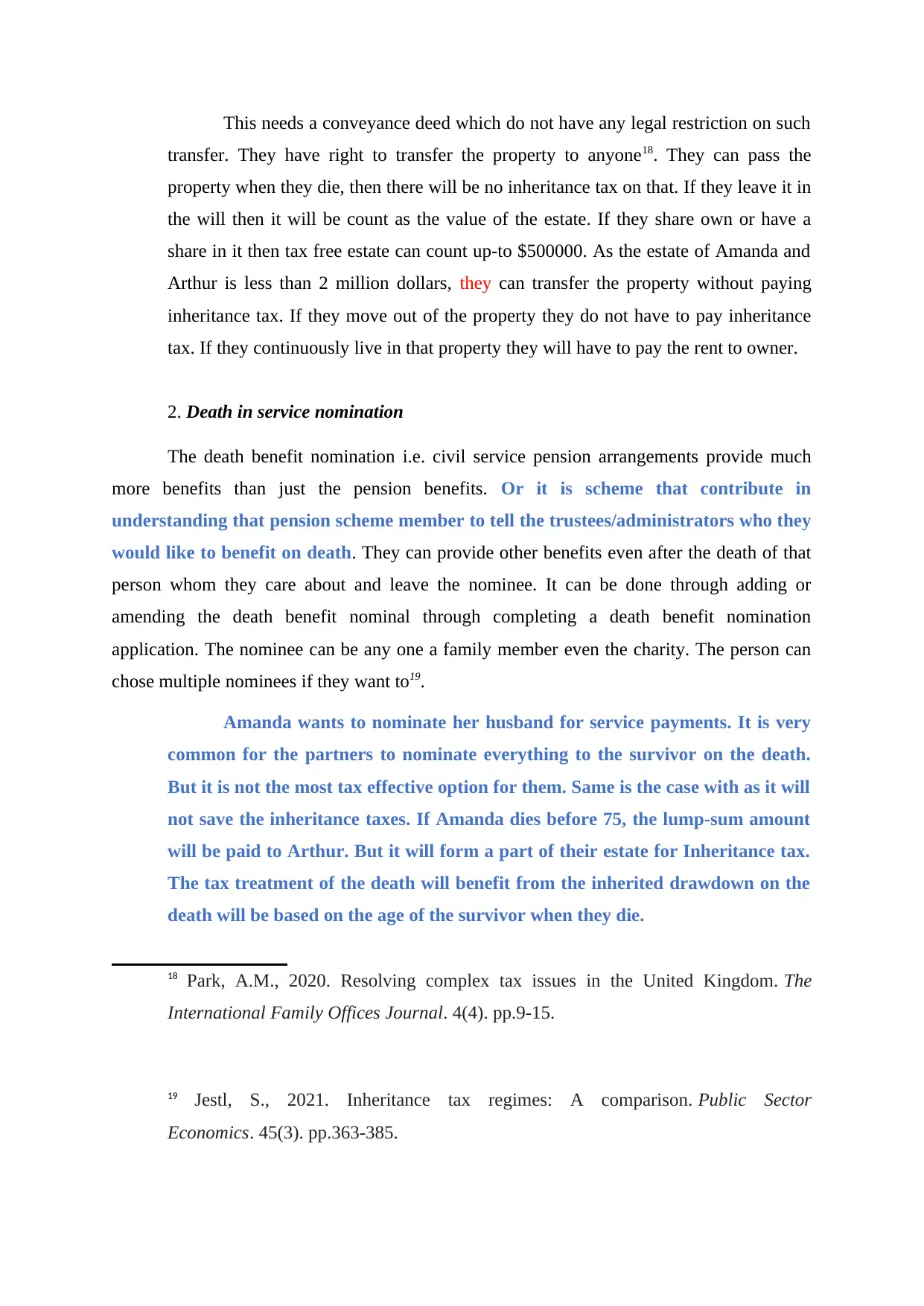
This needs a conveyance deed which do not have any legal restriction on such
transfer. They have right to transfer the property to anyone18. They can pass the
property when they die, then there will be no inheritance tax on that. If they leave it in
the will then it will be count as the value of the estate. If they share own or have a
share in it then tax free estate can count up-to $500000. As the estate of Amanda and
Arthur is less than 2 million dollars, they can transfer the property without paying
inheritance tax. If they move out of the property they do not have to pay inheritance
tax. If they continuously live in that property they will have to pay the rent to owner.
2. Death in service nomination
The death benefit nomination i.e. civil service pension arrangements provide much
more benefits than just the pension benefits. Or it is scheme that contribute in
understanding that pension scheme member to tell the trustees/administrators who they
would like to benefit on death. They can provide other benefits even after the death of that
person whom they care about and leave the nominee. It can be done through adding or
amending the death benefit nominal through completing a death benefit nomination
application. The nominee can be any one a family member even the charity. The person can
chose multiple nominees if they want to19.
Amanda wants to nominate her husband for service payments. It is very
common for the partners to nominate everything to the survivor on the death.
But it is not the most tax effective option for them. Same is the case with as it will
not save the inheritance taxes. If Amanda dies before 75, the lump-sum amount
will be paid to Arthur. But it will form a part of their estate for Inheritance tax.
The tax treatment of the death will benefit from the inherited drawdown on the
death will be based on the age of the survivor when they die.
18 Park, A.M., 2020. Resolving complex tax issues in the United Kingdom. The
International Family Offices Journal. 4(4). pp.9-15.
19 Jestl, S., 2021. Inheritance tax regimes: A comparison. Public Sector
Economics. 45(3). pp.363-385.
transfer. They have right to transfer the property to anyone18. They can pass the
property when they die, then there will be no inheritance tax on that. If they leave it in
the will then it will be count as the value of the estate. If they share own or have a
share in it then tax free estate can count up-to $500000. As the estate of Amanda and
Arthur is less than 2 million dollars, they can transfer the property without paying
inheritance tax. If they move out of the property they do not have to pay inheritance
tax. If they continuously live in that property they will have to pay the rent to owner.
2. Death in service nomination
The death benefit nomination i.e. civil service pension arrangements provide much
more benefits than just the pension benefits. Or it is scheme that contribute in
understanding that pension scheme member to tell the trustees/administrators who they
would like to benefit on death. They can provide other benefits even after the death of that
person whom they care about and leave the nominee. It can be done through adding or
amending the death benefit nominal through completing a death benefit nomination
application. The nominee can be any one a family member even the charity. The person can
chose multiple nominees if they want to19.
Amanda wants to nominate her husband for service payments. It is very
common for the partners to nominate everything to the survivor on the death.
But it is not the most tax effective option for them. Same is the case with as it will
not save the inheritance taxes. If Amanda dies before 75, the lump-sum amount
will be paid to Arthur. But it will form a part of their estate for Inheritance tax.
The tax treatment of the death will benefit from the inherited drawdown on the
death will be based on the age of the survivor when they die.
18 Park, A.M., 2020. Resolving complex tax issues in the United Kingdom. The
International Family Offices Journal. 4(4). pp.9-15.
19 Jestl, S., 2021. Inheritance tax regimes: A comparison. Public Sector
Economics. 45(3). pp.363-385.
⊘ This is a preview!⊘
Do you want full access?
Subscribe today to unlock all pages.

Trusted by 1+ million students worldwide
1 out of 16
Your All-in-One AI-Powered Toolkit for Academic Success.
+13062052269
info@desklib.com
Available 24*7 on WhatsApp / Email
![[object Object]](/_next/static/media/star-bottom.7253800d.svg)
Unlock your academic potential
Copyright © 2020–2026 A2Z Services. All Rights Reserved. Developed and managed by ZUCOL.